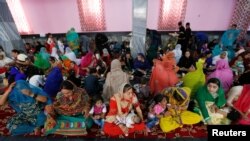Following a militant attack in late March that killed 25 Sikhs in Afghanistan’s capital, Kabul, a dwindling community of Sikhs and Hindus is now weighing whether or not it is safe to stay in the war-torn country where the minority group is subject to constant threats by militants and discrimination by others.
The March 25th gunman attack on a Sikh temple in Kabul’s Shor Bazar Gurdwara area was claimed by the Islamic State terror group. Many Sikh and Hindu activists have since appealed for international assistance to help relocate them to outside of Afghanistan.
"If you stop a Sikh child and ask him what he wishes, he will say that he wants to leave Afghanistan,” said Singh, a 22-year-old Sikh who was among nearly 150 people trapped in the religious complex assailed by a group of IS militants. “Who is not happy to live in peace?”
Singh requested anonymity over concerns for his safety for speaking openly.
Recalling the horrific incident that ended after about six hours of fire exchange between IS militants and Afghan security forces, he told VOA that he considers his survival a miracle.
"We went to a room and locked the door from inside. I saw the shadow of him [an IS fighter].”
Singh’s father, nephew, and sister-in-law were among the 25 people killed in the IS attack. Heartbroken by the loss, he says he is now committed to leave Afghanistan with his family “to have a better future, where there is no fear.”
Activists Concerned About Safety of Hindus, Sikhs in Afghanistan | Voice of America - English
The two minority groups were once thriving with a substantial involvement in Afghanistan’s trade and business. But, since the 1978 conflict, Sikhs and Hindus have found themselves increasingly targeted. The population of both minorities has shrunk from about 250,000 to less than a thousand.
Deepak Ahluwalia, a California-based immigration attorney and Sikh rights activists, said that he believed Hindus and Sikhs in Afghanistan were facing religious persecution and “are being threatened with genocide.”
Broad Discrimination
The Taliban in the past have ordered the Sikhs to wear yellow armbands so they could be easily distinguished from the Muslim majority. A more extremist Sunni group, IS, considers both Hindus and Sikhs to be pagans.
According to Afghanistan Independent Human Rights Commission (AIHRC), the two minorities also face institutional and cultural discrimination.
Zabihullah Farhang, a spokesperson for AIHRC, told VOA that Hindus and Sikhs “face a lot of discrimination in the public places, with their children in schools, with employment and work opportunities.”
Farhang said that Hindus and Sikhs were not given the same rights as Afghan Muslims, and the minority groups felt increasingly targeted.
“One of the main reasons that they are leaving their country, without doubt, is cultural issues,” he added.
Illegal property seizure
The country’s constitution and government have further deepened the isolation, charged Rajdeep Jolly, a Sikh rights attorney in Washington, DC. He said Article 62 of the Afghan constitution that states only a Muslim can run for president shows religious minorities are looked down upon.
“Even in the absence of genocidal violence, the Afghan legal system has relegated Sikhs and Hindus to second-class citizenship,” said Jolly, adding that the two communities face obstacles from basic religious rituals such as cremation to judicial bias and illegal property seizures.
Afghan government says they are doing their best to protect them from militant attacks.
“The Afghan Security Council has started some measures and they will take serious actions for their security,” Dawa Khan Menapal, a spokesman for the Afghan president, told VOA.
Menapal said the country in the past few years under President Ashraf Ghani has made significant progress to address the issues these communities face. He said Hindus and Sikhs have two members in the Afghan parliament “who raise the voices and concerns of their constituencies.”
Some Stay
Some members of the minority groups say they are not willing to give in despite continued terror attacks and discrimination.
Commenting on whether Hindus and Sikhs in recent weeks have begun to flee to the West, Narinder Singh Khalsa, a lawmaker representing Hindus and Sikhs in Wolesi Jirga or the lower house of Afghanistan’s parliament, told VOA that the two communities “have not made such a decision yet.”
“Reports published by media outlets outside Afghanistan saying that Hindus and Sikhs of Afghanistan are trying to seek asylum are all baseless,” he said.
‘It is our country’
Gornam Singh,24, is determined to stay in Afghanistan. He told VOA that Afghanistan has issues at all levels, but this is his country.
“The whole Afghanistan has concerns. All are worried, from the president to a vender but this is Afghanistan. It is our country,” Singh said.
Balbeer Singh Pahwa, the vice president of an Afghan-Sikh Gurdwara in New York, who was born and raised in Kabul said he does not remember an intolerant Afghanistan when he lived in it and regretted the path Afghanistan has since taken.
“Afghanistan was very different then. Kabul was like living in a European country, we had no problem of religion at that time,” he said.
Pahwa left Afghanistan in 1983 due to the Soviet Union’s invasion of the country.He said that they were able to freely perform their religious rituals when he lived in Kabul.
“Every year for Basakhi, Sikhs families would all travel to Sultanpur and Jalalabad. There were maybe 2000 people, about 500-600 families at the time. We would set up tents and stay there for a week. Sikhs believe that Guru Nanak was there,” he added.
Major loss of culture
Some minority activists see the end of Sikh and Hindu minorities in Afghanistan as a major loss for the country’s rich culture. A more diverse and tolerant Afghan society, they argue, could play a major role in developing the country.
Manmeet Singh, a U.S.-based activist and filmmaker, said the remaining Hindus and Sikhs in the county were “the last descendants of a pre-Islamic civilization dating back thousands of years.”
He warned “their exodus from Afghanistan will be a triumph for fanatics and a tragedy for the world.”






